Seattle, Washington—“I guess I was ‘bout nineteen, or thereons.
I had a good job, good enough at least that I could afford to send my wife on a winter’s vacation with some of her girlfriends to Cancun for ten days. It get awful cold up there in Milwaukee, that’s for sure.”
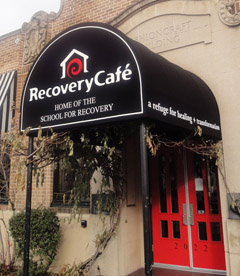 It was the second week of December, and I was talking with a man my age, call him Levon, as we sat together in the Recovery Cafe, a bright, light-filled, and thoughtfully-designed space in downtown Seattle, where poor, addicted, and mentally-frail people come for comfort and care. This cheerful spot, at the center of which is a coffee bar, with dedicated baristas who make a mighty fine latte, was founded and is still overseen by an old friend of mine, Killian Noe.
It was the second week of December, and I was talking with a man my age, call him Levon, as we sat together in the Recovery Cafe, a bright, light-filled, and thoughtfully-designed space in downtown Seattle, where poor, addicted, and mentally-frail people come for comfort and care. This cheerful spot, at the center of which is a coffee bar, with dedicated baristas who make a mighty fine latte, was founded and is still overseen by an old friend of mine, Killian Noe.
Killian and I went to Yale Divinity School together, where we met and befriended one another early in our theological studies—not for the least reason, because we are both P.K.’s (preacher’s kids) and each made a journey away from our upbringing in Fundamentalist Christianity. Like all emigrants, Killian and I like to reminisce about the old country. Recently, she told me about her brother-in-law, who is a “Minister of Music,” (even the phrase made me smile) at a Southern Baptist mega-church in South Carolina. Killian dreads attending the Christmas Pageant he produces each year which, in addition to a full-scale recreation of the stable at Bethlehem complete with camels and sheep, also features a parade of U.S. soldiers marching through the church’s aisles with their weapons proudly brandished. As if this clash of imagery—a true melding of church and state—weren’t enough, at the pageant’s end, a cross rises up at the back of the stage, and a young man portraying Jesus is shown, nailed to its beams. God Bless America!
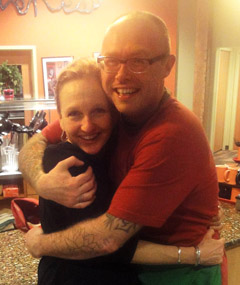 When Killian learned of my “cooking for others” project, she invited me to come to Seattle in December, and make a holiday meal for the Recovery Cafe’s clients and guests. One of whom, was Levon.
When Killian learned of my “cooking for others” project, she invited me to come to Seattle in December, and make a holiday meal for the Recovery Cafe’s clients and guests. One of whom, was Levon.
“Well, the ladies was on an early flight from O’hare to Mexico,” he continued, “So early, in fact, it seem like a good idea that they should all gather over at our apartment, and we’d stay up all night partyin’, and then they wouldn’t have to worry about oversleepin’, and missin’ they’s flight.”
I agreed this sounded like an excellent plan.
“So, I lays in the supplies. They was cocaine, of course, and reefer. And they was plenty of liquor.”
“Naturally,” I said.
As Levon tells it, the ladies and he had a good old time, and sometime before dawn, he helped them all into a shuttle van, whose driver he entrusted to take them safely to the airport, and off to Cancun. He want back inside the house, and the next thing he remembers, Levon’s wife was banging on the door and screaming his name.
“I thought you was going to Mexico,” he called out.
“You fool. I done gone to Cancun, and now I done come back! Now get your ass to this door, and let me in!”
Levon shook his head, smiling at the memory.
“So, what?” I asked, thinking I’d missed part of the story. “You didn’t go outside for ten days? How did you eat? Did people come visit you?”
“I have no idea what I done got up to. My neighbors later told me that they heard me playin’ my trumpet once in awhile. And, I found I wrote a song or two. All I know for sure, though, is that every last speck and drop of them party supplies was gone!”
Earlier in our conversation, Levon had told me that when he was growing up in Milwaukee, he was already drinking and doing drugs by the time he was ten. His father was in prison, so he learned how to live from the other men in his neighborhood.
“The thing is, they all had jobs,” he said. “They go to the factory, or the shop. They work all day; they do they’s time. But after they punch out? They go get fucked up. It just seem completely normal to me. It’s all I saw; I thought that’s what being a man was. So, I’m young, but I want to be a man, so I start getting high.”
Levon became sober at age 20, or a year before he was legally allowed to consume alcohol in the state of Wisconsin.
I’m also getting over my guilty sense that I’m simply a voyeur, and that I have no right to be in these places, talking to these people, asking them about their lives. No. It’s exactly the opposite. People want to tell their stories. They need to be heard.
People have hard lives: much harder than yours, I’ll wager, and much harder than mine. I’ve known depression and isolation; but most of my suffering over the years has been in my mind. I’ve never gone hungry, nor been in need of clothing or a place to sleep. The more time I spend in soup kitchens and homeless shelters, though, the more it makes me question my presuppositions, my sense of what is, what should be, and why I believe what I believe. How can any one way of thought apply to all people, when not only are people so different in nature, but they have been nurtured so very differently? When I was ten, my father was tossing me quarters from his pocket if I used a word he liked. Levon, at the same age, was pistol-whipped by a boyfriend of his mother’s because he knocked over the guy’s bong.
I’m also getting over my guilty sense that I’m simply a voyeur, and that I have no right to be in these places, talking to these people, asking them about their lives. No. It’s exactly the opposite. People want to tell their stories. They need to be heard. They suspect, as the playwright Andrea Hairston once said, “If no one tells your story, you die twice.”
 My way of saying thank you for the simple candor of Levon, and stories I heard from other people at the Recovery Cafe, was to cook a special holiday meal. I devised a complicated menu of Brazilian seafood stew (rich with shrimp, chorizo, tomatoes and red peppers), and a chocolate bread pudding for dessert. The dinner was a big success, although my normal propensity to make way too much food utterly failed me in Seattle. Each one of the 150 or so guests had at least two full plates of seafood stew served over saffron rice, but I spotted people running their fingers around the empty stainless steel serving trays, so greedy were they for more.
My way of saying thank you for the simple candor of Levon, and stories I heard from other people at the Recovery Cafe, was to cook a special holiday meal. I devised a complicated menu of Brazilian seafood stew (rich with shrimp, chorizo, tomatoes and red peppers), and a chocolate bread pudding for dessert. The dinner was a big success, although my normal propensity to make way too much food utterly failed me in Seattle. Each one of the 150 or so guests had at least two full plates of seafood stew served over saffron rice, but I spotted people running their fingers around the empty stainless steel serving trays, so greedy were they for more.
And no one, I noticed, had a lustier appetite than Victoria.
She was the surprise entertainment at the dinner’s close. For the delight of her guests and, doubtless, for Killian to amuse herself by arranging an extravaganza completely different from her brother-in-law’s “Praise the Lord, and pass the ammunition” Christmas pageant, she arranged for Victoria, a very full-figured drag queen, to perform a few songs. When I met him earlier that day, out of his wig and make-up, the young man who transformed himself into Victoria assured me that he had “complete mastery” of both the entire songbook of Bette Midler and Mariah Carey. Which diva would I prefer? he asked. Oh, Lord. That was a tough choice.
“Couldn’t you just surprise me, Victoria?”
“Girl! You bet your tits I’ll surprise you,” he replied.
Most of the dinner guests were grizzled older men and women, some talking to themselves, and brushing imaginary demons or insects off of their shoulders.
As the meal wound down, and the last smidgen of chocolate bread pudding was licked off a serving spoon, Victoria emerged from one of the Recovery Cafe’s counseling rooms, signaled the sound guy to start the CD, and stalked to a microphone, set up in front of the dining room, and beside a Christmas tree twinkling with wan lights. The poor shrub looked particularly anemic next to Victoria, who was resplendent in high heels made of plexiglass, her ample body poured into a black and silver mini-dress. She began her act with Mariah Carey’s 1991 blockbuster hit, “Emotions.” This tune, as you doubtless recall, was a showcase for Carey’s nearly ludicrous command of higher-than-high notes, a stratospheric octave range sometimes known as, Victoria informed me earlier, the “whistle register.”
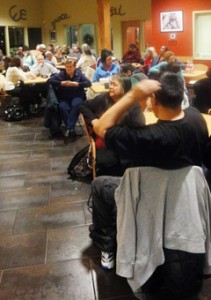 I might as well pause here for a moment to note that this whole scene made me slightly nervous. If anything is an acquired taste, it’s camp humor and especially drag. It’s not necessarily that you love it or hate it. It’s that you love it more, the more you are exposed to it. Camp is far funnier the twentieth time you hear a joke, than the first. Not to mention that, despite all the let’s-all-love-one-another posters taped up showing photographs of Rosa Parks, The Buddha, and Martin Luther King, Jr., this was still a pretty tough room to work. Most of the dinner guests were grizzled older men and women, some talking to themselves, and brushing imaginary demons or insects off of their shoulders. Worse, many stared blankly ahead, the room and their future something of a dark cloud.
I might as well pause here for a moment to note that this whole scene made me slightly nervous. If anything is an acquired taste, it’s camp humor and especially drag. It’s not necessarily that you love it or hate it. It’s that you love it more, the more you are exposed to it. Camp is far funnier the twentieth time you hear a joke, than the first. Not to mention that, despite all the let’s-all-love-one-another posters taped up showing photographs of Rosa Parks, The Buddha, and Martin Luther King, Jr., this was still a pretty tough room to work. Most of the dinner guests were grizzled older men and women, some talking to themselves, and brushing imaginary demons or insects off of their shoulders. Worse, many stared blankly ahead, the room and their future something of a dark cloud.
Victoria was an extremely talented performer, and had every move, note, and gesture down cold. She quivered her cheeks comically to burlesque Carey’s penchant for melisma, and as Carey’s voice soared up-up-upwards, Victoria would cup her ear, as the diva herself does, to “sound check” her own warblings. Still, I couldn’t really take the temperature of the audience, and had no idea how the act was going over.
Well, let it be said, Victoria blew the roof off Recovery Cafe. When “Emotions” ended, the place went ape shit. People were cheering and screaming, and really punching the second syllable of the star’s name: “Vic-TOE-ria! Vic-TOE-ria!
Not shy, or surprised in the least, Victoria scampered about, rubbing her bosom in men’s faces, and hissing comically while baring her painted fingernails at the women. This got the crowd even more riled up. “More!” they screamed. “Vic-TOE-ria!”
What happened next was truly the Christmas miracle.
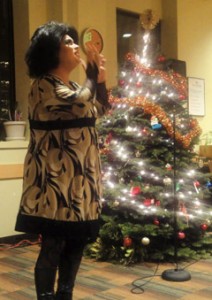 With a flick of her wrist, Victoria gave another signal to the sound guy. She then walked back to her microphone and launched into lip-syncing Mariah Carey’s rendition of “O, Holy Night,” which is, in my opinion, probably the most poignant of all Christmas carols. The melody has such peculiar power, even an agnostic or atheist can be moved by it. Written nearly 150 years old, “O, Holy Night” was among the earliest pieces of music ever heard on the radio, when on December 24, 1906, a Canadian inventor, Reginald Fessenden, broadcast the first AM radio program and included the song on his playlist.
With a flick of her wrist, Victoria gave another signal to the sound guy. She then walked back to her microphone and launched into lip-syncing Mariah Carey’s rendition of “O, Holy Night,” which is, in my opinion, probably the most poignant of all Christmas carols. The melody has such peculiar power, even an agnostic or atheist can be moved by it. Written nearly 150 years old, “O, Holy Night” was among the earliest pieces of music ever heard on the radio, when on December 24, 1906, a Canadian inventor, Reginald Fessenden, broadcast the first AM radio program and included the song on his playlist.
What Reginald Fessenden would have made of Mariah Carey’s melodramatic version, not to mention Victoria’s impersonation of it, I can scarcely say. However, the stirring effect it had on this crowd in Seattle was extraordinary to see. Victoria had people laughing and crying, literally, at the same time. Grown men, myself very much included, had tears running openly down their cheeks as she sang the words:
A thrill of hope; the weary world rejoices,
For yonder breaks a new and glorious morn.
Fall on your knees! O hear the angel voices!
O night divine, the night when Christ was Born;
O night, O holy night, O night divine!
It was, indeed, a night divine at the Recovery Cafe.
Life is tragic and comic. Laughter and tears can arrive simultaneously.
The following morning, as Killian and I ate breakfast together at her house, we basked in the afterglow. O.K. O.K. It was just a cabaret, not the end of war, sickness or poverty, not the beginning of a new golden age. Victoria (and Brazilian seafood stew) can only accomplish so much.
Still, as I think about it, this evening made me aware of the long road I’ve been on, and how comforting it is to have arrived at a point in my life where I’m less afraid of paradox, and can allow myself to see two things at once. Life is tragic and comic. Laughter and tears can arrive simultaneously. And, it’s even possible for a bawdy drag queen to be a messenger of what’s most holy, of the “new and glorious morn.”
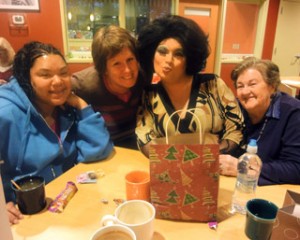 And, by that “morn,” I’m not necessarily talking about Jesus. Or, put another way, I’m able to see him two ways, too—which is appropriate, since we’re told he was supposed to be both fully human, and fully God. Maybe Jesus did die on a cross, and take away the sins of the world. Fine. But I’m more interested in his life. Jesus preached a message of tolerance, and generosity, and acceptance of “others,” with all their perplexing differences. In the process, he was not founding a fundamentalist church, with oodles of doctrines, laws and judgments. On the contrary, Jesus’ message was elastic, inclusive and marvelously simple. Now abides faith, hope and love, but the greatest of these is…love.
And, by that “morn,” I’m not necessarily talking about Jesus. Or, put another way, I’m able to see him two ways, too—which is appropriate, since we’re told he was supposed to be both fully human, and fully God. Maybe Jesus did die on a cross, and take away the sins of the world. Fine. But I’m more interested in his life. Jesus preached a message of tolerance, and generosity, and acceptance of “others,” with all their perplexing differences. In the process, he was not founding a fundamentalist church, with oodles of doctrines, laws and judgments. On the contrary, Jesus’ message was elastic, inclusive and marvelously simple. Now abides faith, hope and love, but the greatest of these is…love.
As I mused aloud on some of this to Killian, she smiled.
“I agree. In fact, I’ve decided that I really can’t be a part of any one church these days, because they are all too exclusive. All faiths and creeds, ultimately, get their power by denying the validity of others. I have decided that I can only try to live my life, at all times, with love. I focus on being as loving as I can be, to as many people as possible. I don’t think much about Heaven, or Hell. But when I do, if simply being a loving person isn’t good enough for God, well, so be it.”
Yes. So be it.



